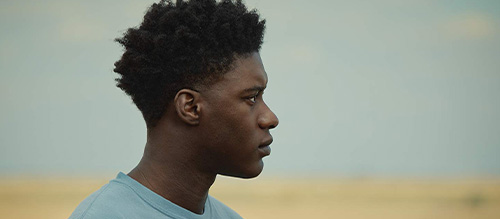The Last Tree (2019) Review
The Last Tree (2019)
Director: Shola Amoo
Screenwriter: Shola Amoo
Starring: Sam Adewunmi, Denise Black, Gbemisola Ikumelo, Nicholas Pinnock
Shola Amoo, who received a warm critical reception for his feature debut A Moving Image (2016), returns to the big screen with another socially conscious and particularly british piece, this time examining the underprivileged youth of the UK; particularly the children battling to grow up against a backdrop of poverty, class war and racial politics in the heart of England’s capital. An immaculately conceived story, The Last Tree is well written and features a number of stellar performances, not least from lead Sam Adewunmi, and slowly builds itself into being more than its most simple description – that being “a well aimed underclass-driven Kitchen Sink Drama” – becoming something more akin to Barry Jenkins’ poetic masterpiece Moonlight (2016).
It’s Jenkins’ Oscar-winning drama about an underclass Floridian boy that proves to be a very clear inspiration for The Last Tree in more ways than simply its visuals, the Amoo film being similarly told across three clearly defined acts at different stages of the protagonist’s life – youth, adolescence and burgeoning adulthood – even going so far as to cast two different actors to play the ageing character. Like in Moonlight, Femi (Adewunmi) has a difficult relationship with his parents yet is forced to return to his problematic and empoverished mother after a glimpse at a better life (in this case with a foster mother). Thematically, The Last Tree also borrows a lot from its American brethren, making a point of water being a cleanser for the soul and therefore the beach being a road to new spiritual horizons, and clearly making an intended audio-visual effort to make poetry of the inner workings of a noisy adolescent mind.
The similarities that can be made between the two movies is complimentary to Amoo’s project, the very best of the film’s achievements in visual and audio artistry coming together in moments where Jenkins’ inspiration rings loudest, such as when the camera locks with the lead’s face as the noise in his head overtakes that of the world, the filmmaker almost prodding us to feel what Femi must be feeling as he forces our eyes to lock with his. However, the homage does at times become distracting, the flair of Amoo’s own style blurred behind what feels like a remix of a movie not long released, the originality and what could have been uniquely British aspects of the picture – the settings, school life, language and violence – taking a backseat to a more bland, though arguably more universally recognisable, use of the mise-en-scene.
The Last Tree also suffers from pacing issues, the film taking a while to kick into gear and the final act seeming to take forever to finish, with the 2nd act contradicting the rest of the picture by being close to sensational in almost every aspect. While the first act has the excuse of being a much needed evaluation of the human soul in advance of the 2nd act’s moving exploration of what can come to unravel it, the final act feels forced and out of place, the tone of this section of the movie jumping from incredibly serious to lightly comedic and back again seemingly out of nowhere, the overall narrative suffering as a result.
Even so, the story at the heart of this film is truly engaging, nay highly emotional and somewhat challenging. Amoo’s previous picture was a London-based docu-drama about class and wealth, and the same points of interest come to the fore here, his presentation of gang culture and youth crime being particular focuses, and each met with an eye to understanding how and why these things come to be as opposed to necessarily challenging them in any sort of potentially patronising manner.
Amoo also never loses focus over the character at the heart of his picture, Femi coming to feel every bit as tangible, genuine and real as any person you’ve ever met, his decisions always understandable and his dialogue always so grounded that it’s almost as if it wasn’t even written. Amoo’s guidance to an inexperienced cast brings out some tremendous performances, the shell of a film he creates around them protecting each member from having their lack of experience exposed, and the filmmaker clearly having an exceptional skill for spotting talent and bringing such a high level of performance out of them.
While The Last Tree is clearly inspired by, and at times damagingly in homage to, Barry Jenkins’ Best Picture winner Moonlight, the comparison is for the most part what makes the film so cinematic and therefore so marketable. If Amoo had made the same picture without said inspiration, it may not have made it to cinema screens, Ken Loach seemingly being the last bastian of “every drama a hit” UK independent film and Amoo of course finding success (so far as receiving funding for his work) in a newly evolved model because of his visual flare and traditionally risky techniques. As a viewer, the impact of this evolution is both positive and frustrating so far as The Last Tree goes, but over the course of its 99 minute runtime seems to land more in the territory of the interesting and aesthetically pleasing, making for a British offering that will not only make you think about its message and feel towards its characters, but also encourage you to take in the very essence of cinema as an art form. A strong 2nd film from a fledgling director with lots to offer.
15/24
[DISPLAY_ULTIMATE_SOCIAL_ICONS]


